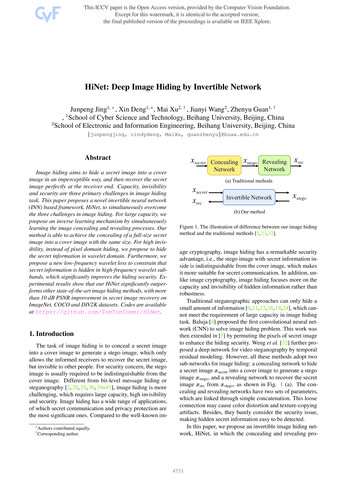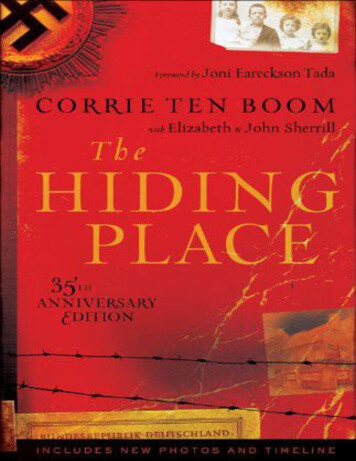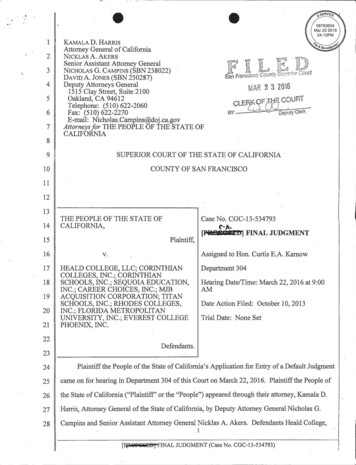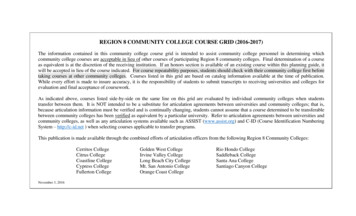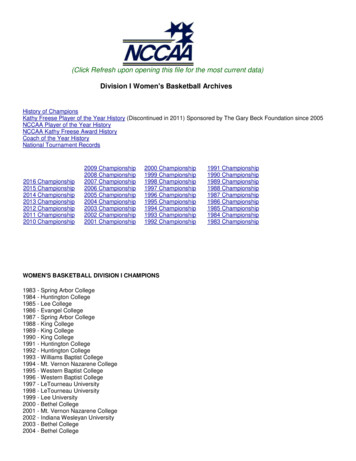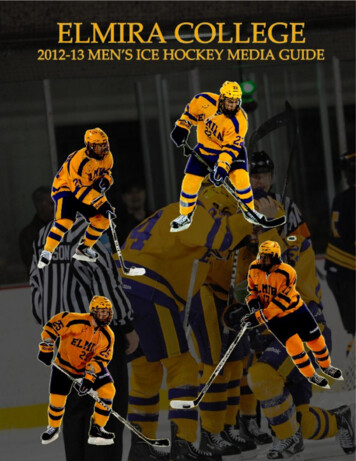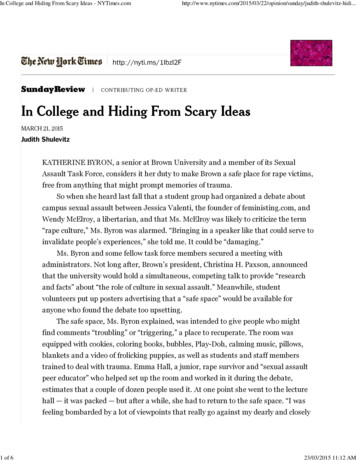
Transcription
In College and Hiding From Scary Ideas - NYTimes.com1 of judith-shulevitz-hidi.23/03/2015 11:12 AM
In College and Hiding From Scary Ideas - NYTimes.com2 of judith-shulevitz-hidi.held beliefs,” Ms. Hall said.Safe spaces are an expression of the conviction, increasingly prevalent amongcollege students, that their schools should keep them from being “bombarded” bydiscomfiting or distressing viewpoints. Think of the safe space as the live-actionversion of the better-known trigger warning, a notice put on top of a syllabus or anassigned reading to alert students to the presence of potentially disturbing material.Some people trace safe spaces back to the feminist consciousness-raising groupsof the 1960s and 1970s, others to the gay and lesbian movement of the early 1990s.In most cases, safe spaces are innocuous gatherings of like-minded people who agreeto refrain from ridicule, criticism or what they term microaggressions — subtledisplays of racial or sexual bias — so that everyone can relax enough to explore thenuances of, say, a fluid gender identity. As long as all parties consent to suchrestrictions, these little islands of self-restraint seem like a perfectly fine idea.But the notion that ticklish conversations must be scrubbed clean of controversyhas a way of leaking out and spreading. Once you designate some spaces as safe, youimply that the rest are unsafe. It follows that they should be made safer.This logic clearly informed a campaign undertaken this fall by a ColumbiaUniversity student group called Everyone Allied Against Homophobia that consistedof slipping a flier under the door of every dorm room on campus. The headline of theflier stated, “I want this space to be a safer space.” The text below instructed studentsto tape the fliers to their windows. The group’s vice president then had the flierpublished in the Columbia Daily Spectator, the student newspaper, along with aneditorial asserting that “making spaces safer is about learning how to be kind to eachother.”A junior named Adam Shapiro decided he didn’t want his room to be a saferspace. He printed up his own flier calling it a dangerous space and had that, too,published in the Columbia Daily Spectator. “Kindness alone won’t allow us to gainmore insight into truth,” he wrote. In an interview, Mr. Shapiro said, “If the point ofa safe space is therapy for people who feel victimized by traumatization, that soundslike a great mission.” But a safe-space mentality has begun infiltrating classrooms,he said, making both professors and students loath to say anything that might hurtsomeone’s feelings. “I don’t see how you can have a therapeutic space that’s also anintellectual space,” he said.I’m old enough to remember a time when college students objected to providing23/03/2015 11:12 AM
In College and Hiding From Scary Ideas - NYTimes.com3 of judith-shulevitz-hidi.a platform to certain speakers because they were deemed politically unacceptable.Now students worry whether acts of speech or pieces of writing may put them inemotional peril. Two weeks ago, students at Northwestern University marched toprotest an article by Laura Kipnis, a professor in the university’s School ofCommunication. Professor Kipnis had criticized — O.K., ridiculed — what she calledthe sexual paranoia pervading campus life.The protesters carried mattresses and demanded that the administrationcondemn the essay. One student complained that Professor Kipnis was “erasing thevery traumatic experience” of victims who spoke out. An organizer of thedemonstration said, “we need to be setting aside spaces to talk” about “victimblaming.” Last Wednesday, Northwestern’s president, Morton O. Schapiro, wrote anop-ed article in The Wall Street Journal affirming his commitment to academicfreedom. But plenty of others at universities are willing to dignify students’ fears,citing threats to their stability as reasons to cancel debates, disinvite commencementspeakers and apologize for so-called mistakes.At Oxford University’s Christ Church college in November, the college censors (a“censor” being more or less the Oxford equivalent of an undergraduate dean)canceled a debate on abortion after campus feminists threatened to disrupt itbecause both would-be debaters were men. “I’m relieved the censors have made thisdecision,” said the treasurer of Christ Church’s student union, who had pressed forthe cancellation. “It clearly makes the most sense for the safety — both physical andmental — of the students who live and work in Christ Church.”A year and a half ago, a Hampshire College student group disinvited an Afrofunkband that had been attacked on social media for having too many white musicians;the vitriolic discussion had made students feel “unsafe.”Last fall, the president of Smith College, Kathleen McCartney, apologized forcausing students and faculty to be “hurt” when she failed to object to a racial epithetuttered by a fellow panel member at an alumnae event in New York. The offenderwas the free-speech advocate Wendy Kaminer, who had been arguing against the useof the euphemism “the n-word” when teaching American history or “The Adventuresof Huckleberry Finn.” In the uproar that followed, the Student GovernmentAssociation wrote a letter declaring that “if Smith is unsafe for one student, it isunsafe for all students.”“It’s amazing to me that they can’t distinguish between racist speech and speech23/03/2015 11:12 AM
In College and Hiding From Scary Ideas - NYTimes.com4 of judith-shulevitz-hidi.about racist speech, between racism and discussions of racism,” Ms. Kaminer said inan email.The confusion is telling, though. It shows that while keeping college-leveldiscussions “safe” may feel good to the hypersensitive, it’s bad for them and foreveryone else. People ought to go to college to sharpen their wits and broaden theirfield of vision. Shield them from unfamiliar ideas, and they’ll never learn thediscipline of seeing the world as other people see it. They’ll be unprepared for thesocial and intellectual headwinds that will hit them as soon as they step off thecampuses whose climates they have so carefully controlled. What will they do whenthey hear opinions they’ve learned to shrink from? If they want to change the world,how will they learn to persuade people to join them?Only a few of the students want stronger anti-hate-speech codes. Mostly theyask for things like mandatory training sessions and stricter enforcement of existingrules. Still, it’s disconcerting to see students clamor for a kind of intrusive supervisionthat would have outraged students a few generations ago. But those were hardiersouls. Now students’ needs are anticipated by a small army of service professionals —mental health counselors, student-life deans and the like. This new bureaucracy maybe exacerbating students’ “self-infantilization,” as Judith Shapiro, the formerpresident of Barnard College, suggested in an essay for Inside Higher Ed.But why are students so eager to self-infantilize? Their parents should probablyshare the blame. Eric Posner, a professor at the University of Chicago Law School,wrote on Slate last month that although universities cosset students more than theyused to, that’s what they have to do, because today’s undergraduates are morepuerile than their predecessors. “Perhaps overprogrammed children engineered tothe specifications of college admissions offices no longer experience the risks andchallenges that breed maturity,” he wrote. But “if college students are children, thenthey should be protected like children.”Another reason students resort to the quasi-medicalized terminology of traumais that it forces administrators to respond. Universities are in a double bind. They’rerequired by two civil-rights statutes, Title VII and Title IX, to ensure that theircampuses don’t create a “hostile environment” for women and other groups subjectto harassment. However, universities are not supposed to go too far in suppressingfree speech, either. If a university cancels a talk or punishes a professor and a lawsuitensues, history suggests that the university will lose. But if officials don’t censure or23/03/2015 11:12 AM
In College and Hiding From Scary Ideas - NYTimes.com5 of judith-shulevitz-hidi.don’t prevent speech that may inflict psychological damage on a member of aprotected class, they risk fostering a hostile environment and prompting aninvestigation. As a result, students who say they feel unsafe are more likely to beheard than students who demand censorship on other grounds.The theory that vulnerable students should be guaranteed psychological securityhas roots in a body of legal thought elaborated in the 1980s and 1990s and still readtoday. Feminist and anti-racist legal scholars argued that the First Amendmentshould not safeguard language that inflicted emotional injury through racist or sexiststigmatization. One scholar, Mari J. Matsuda, was particularly insistent that collegestudents not be subjected to “the violence of the word” because many of them “areaway from home for the first time and at a vulnerable stage of psychologicaldevelopment.” If they’re targeted and the university does nothing to help them, theywill be “left to their own resources in coping with the damage wrought.” That mighthave, she wrote, “lifelong repercussions.”Perhaps. But Ms. Matsuda doesn’t seem to have considered the possibility thatinsulating students could also make them, well, insular. A few weeks ago, Zineb ElRhazoui, a journalist at Charlie Hebdo, spoke at the University of Chicago, protectedby the security guards she has traveled with since supporters of the Islamic Stateissued death threats against her. During the question-and-answer period, a Muslimstudent stood up to object to the newspaper’s apparent disrespect for Muslims and toexpress her dislike of the phrase “I am Charlie.”Ms. El Rhazoui replied, somewhat irritably, “Being Charlie Hebdo means to diebecause of a drawing,” and not everyone has the guts to do that (although she didn’tuse the word guts). She lives under constant threat, Ms. El Rhazoui said. The studentanswered that she felt threatened, too.A few days later, a guest editorialist in the student newspaper took Ms. ElRhazoui to task. She had failed to ensure “that others felt safe enough to expressdissenting opinions.” Ms. El Rhazoui’s “relative position of power,” the writercontinued, had granted her a “free pass to make condescending attacks on a memberof the university.” In a letter to the editor, the president and the vice president of theUniversity of Chicago French Club, which had sponsored the talk, shot back, saying,“El Rhazoui is an immigrant, a woman, Arab, a human-rights activist who hasknown exile, and a journalist living in very real fear of death. She was invited tospeak precisely because her right to do so is, quite literally, under threat.”23/03/2015 11:12 AM
In College and Hiding From Scary Ideas - NYTimes.com6 of judith-shulevitz-hidi.23/03/2015 11:12 AM
about racist speech, between racism and discussions of racism,” Ms. Kaminer said in an email. The confusion is t
